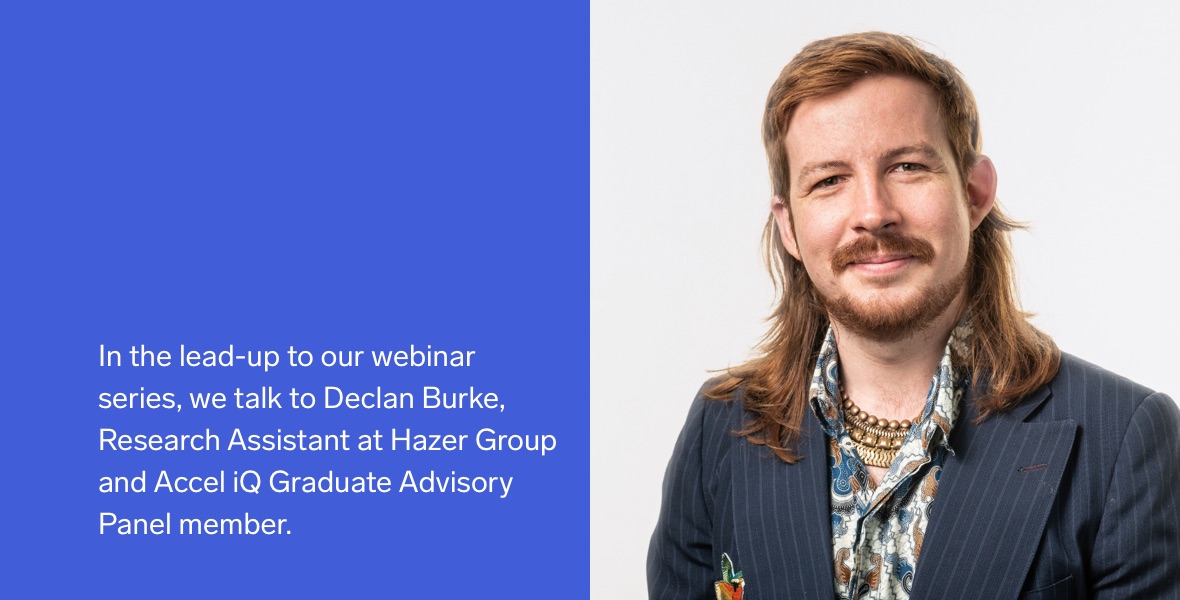From philosophy major to clean energy production
20 Sep 2022
20 Sep 2022

Burke’s role sees him act as problem solver, researching and recommending solutions to the issues that invariably arise when working with complex chemical processes.
“To give you a relatively recent example, coming out of our reactor we have a mixture of materials,” says Burke. “We have a mixture of graphite, iron metal and iron oxide. It’s coming out at about 40 metres per second and 900 degrees celsius or thereabouts. That is going to hit the walls of the pipe on the way through the process and we were concerned that that action might wear away at the pipe, and if it goes undetected it would blow a hole in the side of the pipe, and that’s obviously very bad.”
Burke went away, learnt about pneumatic conveying, and returned with suggestions on how to redesign the pipe, given the issues at hand. “Basically, my role is ‘we need to know this, no one knows this or has the time to know this, so you go away, find out the answer, and then come back and tell us.”
Burke developed a fascination with the sciences while in high school, and quickly understood the call of further study. “I was always going to go down that path, I’ve never been particularly sporty or artistically gifted, I can’t paint or draw,” Burke says.
Though the lessons of high school and an ATAR can only take students so far, Burke has one suggestion for high school students looking to progress to university. “Good study discipline is really important,” says Burke. “As somebody who cruised through high school and to some extent first year [university] on, basically, just being gifted, there is a point at which being gifted stops working.”
Moving into a Bachelor of Science at the University of Western Australia, Burke initially found fascination with the chemistry of perfume. It was another stream of academia entirely, however, that eventually guided Burke to where he is today.
“It was the summer between first and second year, and I had a friend living with me,” Burke says. “My friend who was staying with me told me about the Euthyphro dilemma. The question is, ‘is it good because God says it is good, or does God say it is good because it is good?’”
The conundrum – posed by Socrates in Plato’s dialogue Euthyphro – quickly convinced Burke to take Philosophy as a second major. “Through that I realised that, hey, perfume’s a luxury good, this isn’t doing anyone anything,” Burke says. “I pretty quickly worked out that renewable energy was something I was particularly passionate about.”
The idea of a rounded education – studying subjects beyond the academic stream of a university course – is something Burke passionately recommends. “I’m a firm believer that it is not the first major that is useful, it’s the second major because there are a lot of people with chemistry degrees, there are a lot of people that do maths, but how often do you see someone that does zoology and fine art? Or chemistry and philosophy?” Burke says. “I think it can be helpful in terms of giving you a broader perspective on things and a broader skill set as well.”
I pretty quickly worked out that renewable energy was something I was particularly passionate about.”Declan Burke, Research Assistant – Hazer Group
For Burke, undertaking an Honours year was vital to his transition to post-university life. Grades and rote learning, while important to progress through a degree, are not enduringly relevant in employment. “The skill set that you develop is what’s important,” Burke says. “The research skills I learnt during Honours have been immensely helpful. I learnt more in my Honours year than I did in my entire undergraduate in terms of skills that I still use today.”
For those looking ahead to a future career, Burke has some advice – don’t just think about a job title, consider the component parts of the job, too. “It’s the particular parts of an activity that determine what you like about it,” says Burke. “If someone says they want to be a doctor, well, okay, do you want to do the things a doctor does, or do you want to be a doctor? It’s not what you want to be, it’s what things do you want to do, then work out what that looks like as a way of having a career.”
Looking ahead from high school to university and future employment can be a puzzle for young students. Accel iQ hosted a series of webinars designed to give students an understanding of future STEM careers.
If you couldn’t make it, you can catch up with a full replay of the webinar series to see what you’ve missed.
Interested in learning more about future STEM careers?
Our ambition is not only to ensure that students get the ATAR they need to enter their chosen university and degree; it is to inspire and support students on their journey towards university.
We help students to discover which kind of career path will suit them and support them to choose and be accepted into the right course.
For more information contact us and one of our learning specialists will get back to you.